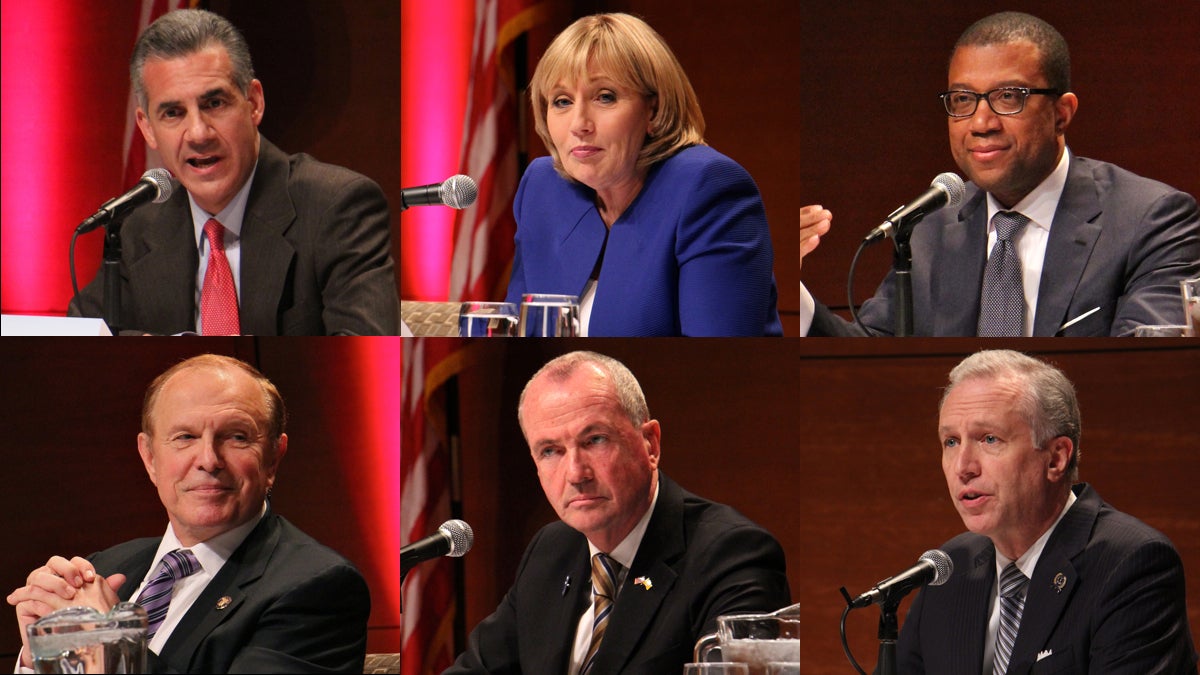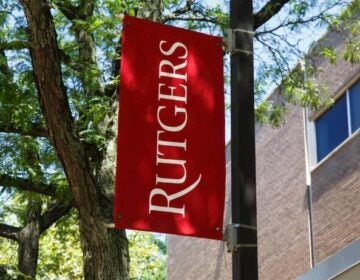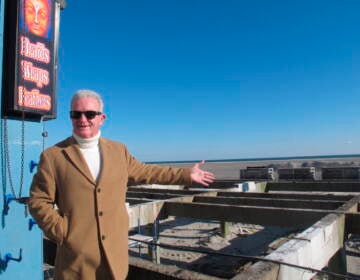(Un)decision 2017: why are so many N.J. voters undecided as primary begins?

Shown are six of 11 candidates in the June 6 primary race for New Jersey governor (clockwise from top left) Republicans Jack Ciattarelli and Kim Guadagno, and Democrats Jim Johnson, John Wisniewski, Phil Murphy, and Raymond Lesniak. (Emma Lee/WHYY)
In a Stockton University poll conducted in mid-May, 31 percent of New Jersey Republicans did not know who they were going to vote for in Tuesday’s gubernatorial primary. For Democrats, that number was 33 percent.
Two weeks earlier, 41 percent of Republicans and Democrats were undecided, according to a Stockton poll.
Political analysts say there are a slew of reasons why voters remain unsure heading into today’s primary election, including a lack of information about the candidates in the media.
Gubernatorial hopefuls trying to broadcast their message to the widest possible audience have to pay for ads in both the New York and Philadelphia media markets, a pricey and burdensome proposition for some statewide candidates.
“If you really want people to know who you are, you’ve got to put yourself on New York network television as well as Philadelphia network television,” said Ben Dworkin, director of The Rebovich Institute for New Jersey Politics at Rider University. “Those are the first and fourth most expensive media markets in the country. So it would cost millions of dollars to really penetrate the public consciousness.”
Once you pay for an ad, though, holding the attention of your audience is the next challenge.
According to Brigid Harrison, a political science professor at Montclair State University, candidates are struggling to win attention in a year when the news has been dominated by President Trump and his first several months in the White House.
“Every night it’s all Trump all the time,” said Harrison, “and that doesn’t leave room for some of the gubernatorial candidates to get their message out to voters.”
New Jersey also staggers its statewide elections with national contests, so voter participation tends to be lower than in big-ticket years, such a presidential races.
But according to Patrick Murray, director of the Monmouth University Polling Institute, many of the voters polled have not made up their minds about the election because they do not plan to vote in it.
Murray said pollsters often survey registered Republicans and Democrats but not necessarily likely voters, which means that some polls include the preferences of residents who will not actually cast a ballot.
“We could find [election] results that are vastly different from what the polls are showing,” he said.
Murray said 1.3 million New Jerseyans voted in the presidential primary last year. He expects fewer than half that number will vote Tuesday.
Because it is so difficult to get name recognition as a politician in New Jersey, Dworkin said, gubernatorial hopefuls in the Garden State have a history of reappearing years after a loss to try again — this time with their name already in the public’s mind.
Former Gov. Tom Kean lost the Republican bid in 1977 only to win election in 1981. Former Gov. Jim Florio ran for the state’s highest office twice before assuming it in 1989. (He also lost a bid for the Democratic nomination for U.S. Senate in 2000 to Jon Corzine.) Both Republican Christine Todd Whitman and Democrat Jim McGreevey also lost statewide elections before later becoming governor.
“We have seen this pattern,” Dworkin said, “where politicians who are running statewide in New Jersey often have to run once — make an entire tour of the state, go through it all once, and not win — just to be able to come back even stronger a few years later.”
Lt. Gov. Kim Guadagno has run for statewide office twice, but as the running mate of Gov. Chris Christie. As New Jersey’s first lieutenant governor, this year’s election tests whether the new position will become a stepping stone to the state’s top office.
WHYY is your source for fact-based, in-depth journalism and information. As a nonprofit organization, we rely on financial support from readers like you. Please give today.




